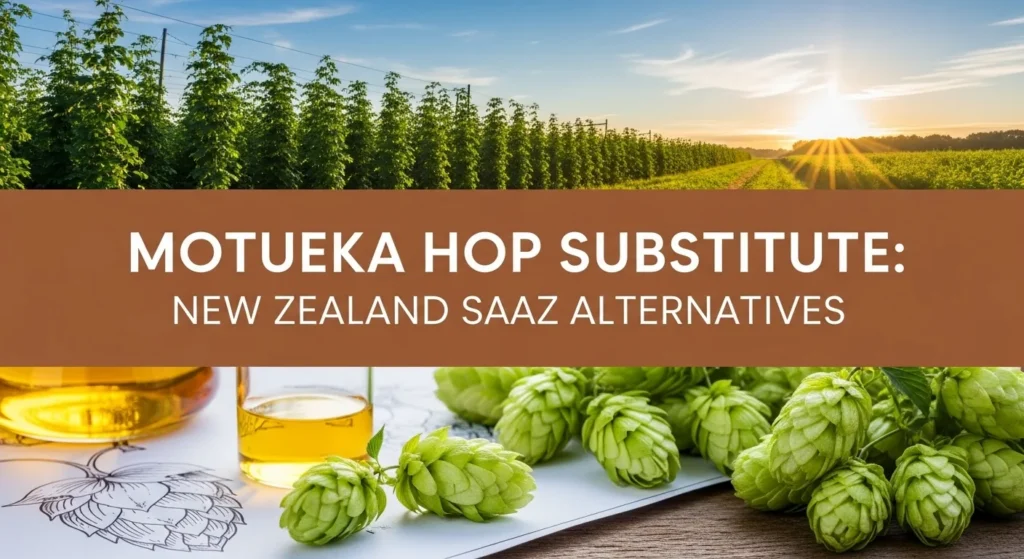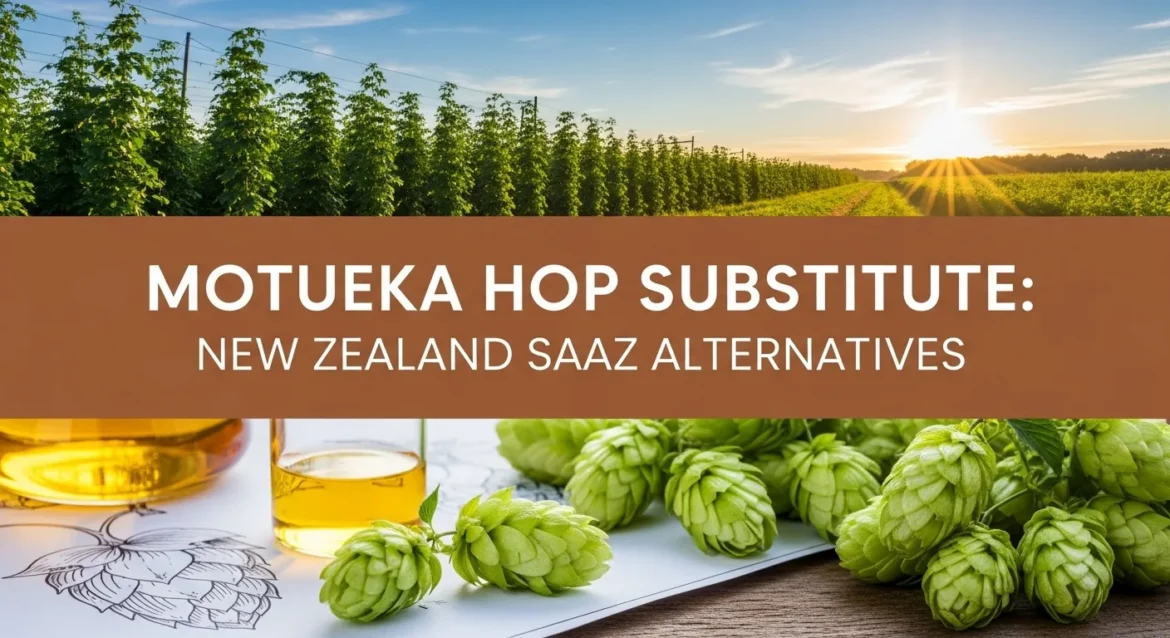Find the best Motueka hop substitutes with New Zealand lime-citrus character. Discover international alternatives for pale ales, IPAs, and pilsners.

Planning that bright, refreshing pale ale with Motueka hops only to discover they’re sold out at your supplier? I’ve experienced that exact frustration countless times in my brewing career. This distinctive New Zealand hop, often called “New Zealand Saaz,” has developed a dedicated following for its unique lime-lemon-tropical character, creating demand that occasionally exceeds availability from limited Southern Hemisphere production. The good news? Several New Zealand, American, and European hop varieties can replicate those distinctive lime, citrus, and tropical notes that make Motueka essential for bright, lively beers.
Finding the right Motueka hop substitute requires understanding what makes this hop special beyond just being from New Zealand. It’s about capturing that distinctive combination of bright lime-lemon citrus, subtle tropical fruit, and lively character with moderate alpha acids that creates refreshing complexity. After brewing with Motueka and testing various alternatives over the past eight years, I’ve identified which substitutes actually deliver on their citrus promises and which fall disappointingly short when vibrant lime character matters.
This guide explores proven alternatives that maintain your beer’s intended flavor profile while offering interesting variations. Whether you’re brewing a New Zealand pale ale, pilsner, or wheat beer, you’ll find practical solutions that work.
Understanding Motueka’s Lime-Citrus Character
Motueka emerged from New Zealand Hops breeding as cross of Saaz with a selected New Zealand male. This aroma hop delivers lime, lemon, tropical, citrus, and lively characteristics with moderate alpha acids of 6.5-7.5%. What distinguishes Motueka from other citrus hops is its remarkably bright lime-lemon character combined with subtle tropical notes and Saaz noble heritage that creates refreshing complexity rather than aggressive single-note citrus.
The hop’s development represented New Zealand brewing’s emphasis on unique citrus-forward aroma hops. Motueka’s moderate alpha acids provide reasonable bittering efficiency while its distinctive lime-tropical character creates genuine brightness when used in late additions where homebrewing equipment can showcase delicate aromatics.
When I first brewed with Motueka in a New Zealand pale ale seven years ago, the vibrant lime aroma with lemon-tropical backing created exactly the bright, refreshing character I sought. That lively, distinctive quality is Motueka’s magic – citrusy enough to create impact yet refined enough to maintain drinkability.
Top Motueka Hop Substitute Options
Saaz: Noble Heritage Parent
Saaz stands as Motueka’s genetic parent, providing noble heritage character. This Czech variety delivers earthy, herbal, spicy, mild, and noble characteristics with lower alpha acids of 3-4.5% that create refined profiles.
Originating from the Žatec region of Bohemia, Saaz represents Motueka’s noble hop heritage. While lacking Motueka’s bright lime-tropical character, Saaz’s refined earthy-herbal-spicy profile shares genetic connection and creates alternatives when noble-like restraint matters more than bold citrus.
When substituting Saaz for Motueka, use approximately 70-90% as much by weight depending on specific alpha acids. The beer’s character shifts dramatically toward earthy-herbal Czech noble rather than lime-tropical New Zealand, creating traditional European profiles instead of bright Southern Hemisphere character. Use Saaz when you want noble refinement from the Brewers Association standards.
Sterling: American Saaz-Type
Sterling brings spicy, herbal, floral, and noble-like characteristics with moderate alpha acids of 6-9%. This American variety bred from Saaz provides similar alpha acid range to Motueka with noble-like character.
Released by USDA breeding from Saaz parentage, Sterling shares Motueka’s genetic heritage. While lacking Motueka’s lime-tropical character, Sterling’s spicy-herbal-floral profile creates alternatives when moderate alpha acids with noble-like refinement matter.
Use approximately equal weights when substituting Sterling for Motueka thanks to similar alpha acids. The beer’s character shifts toward American spicy-herbal rather than New Zealand lime-tropical, creating clean noble-like profiles suitable for lagers and pilsners.
Riwaka: New Zealand Grapefruit-Passion Fruit
Riwaka delivers grapefruit, passion fruit, pine, and citrus characteristics with moderate alpha acids of 4.5-6.5%. This New Zealand variety provides bold Southern Hemisphere citrus-tropical character similar to Motueka’s brightness.
Released from New Zealand Hops breeding, Riwaka shares Motueka’s emphasis on distinctive citrus-tropical character. While emphasizing grapefruit-passion fruit over lime-lemon, Riwaka’s vibrant New Zealand profile creates alternatives when bold Southern Hemisphere character matters.
When substituting Riwaka for Motueka, use approximately 10-20% more by weight to compensate for moderately lower alpha acids. The beer maintains New Zealand citrus-tropical nature while shifting toward grapefruit-passion fruit rather than lime-lemon, creating bold Kiwi profiles.
Kohatu: New Zealand Lime-Pine
Kohatu offers lime, pine, tropical, and citrus characteristics with moderate alpha acids of 6-7%. This New Zealand variety provides lime character similar to Motueka’s distinctive profile with added pine complexity.
Released from New Zealand Hops breeding, Kohatu shares Motueka’s emphasis on lime-citrus character. The hop’s specific lime-pine-tropical profile echoes Motueka’s brightness while adding resinous pine notes, creating direct New Zealand alternatives.
Use approximately equal weights when substituting Kohatu for Motueka thanks to similar alpha acids. The beer maintains lime-citrus character with added pine resin creating bolder New Zealand profiles suitable for hop-forward pale ales and IPAs.
Amarillo: American Orange-Tropical
Amarillo brings orange, lemon, grapefruit, floral, and tropical characteristics with higher alpha acids of 8-11%. This American variety provides citrus-tropical character that can approximate Motueka’s brightness with different emphasis.
Released from Virgil Gamache Farms breeding, Amarillo shares emphasis on citrus-tropical character. While offering higher alpha acids and emphasizing orange over lime, Amarillo’s clean citrus-tropical profile creates alternatives when bold American hop character matters.
When substituting Amarillo for Motueka, use approximately 70-85% of original amounts to compensate for higher alpha acids. The beer’s character shifts toward orange-tropical rather than lime-lemon, creating modern American citrus profiles.
Hallertau Blanc: German White Wine-Passion Fruit
Hallertau Blanc delivers white wine, grape, passion fruit, and lemongrass characteristics with higher alpha acids of 9-12%. This German variety provides unique fruity character with citrus-tropical notes.
Developed in Germany, Hallertau Blanc offers distinctive white wine-passion fruit character. While lacking Motueka’s lime specificity, Hallertau Blanc’s fruity-tropical profile creates alternatives when unique German fruity character with citrus backing matters.
Use approximately 65-80% of Motueka quantities when substituting Hallertau Blanc to compensate for higher alpha acids. The beer’s character shifts toward white wine-grape-passion fruit rather than lime-lemon, creating distinctive German fruity profiles.
Blending Strategies for Complete Substitution
The 60/40 New Zealand Blend
My most successful Motueka replacement combines 60% Kohatu with 40% Riwaka. This blend captures Kohatu’s lime-pine while Riwaka adds grapefruit-passion fruit complexity approximating Motueka’s complete lime-tropical profile with enhanced boldness. The combination creates more layered New Zealand character than either hop alone.
Calculate your total hop bill first, then split according to this ratio for all additions. Use approximately equal total quantities to original Motueka amounts thanks to similar combined alpha acids while achieving vibrant Southern Hemisphere character.
The American Citrus Approach
For accessible alternatives, use Amarillo alone or blend 70% Amarillo with 30% Sterling. This combination emphasizes Amarillo’s orange-tropical while Sterling adds noble-like herbal creating American interpretation of citrus brightness.
Use reduced quantities (approximately 70-80% of original Motueka amounts) to compensate for higher combined alpha acids. The American character creates accessible alternatives when New Zealand hops prove unavailable.
Single-Hop Simplicity
Sometimes simplicity wins. For straightforward beers where lime character matters most, Kohatu alone provides closest New Zealand substitution at equivalent weights. The hop’s lime-pine nature makes it ideal when Kiwi character defines the recipe.
For beers demanding citrus brightness with higher alpha acids, Amarillo by itself works at reduced quantities. The hop’s proven performance creates compelling alternatives when American citrus suffices.
Beer Style Considerations
New Zealand Pale Ales and IPAs
These Southern Hemisphere styles showcase Motueka beautifully. Kohatu or Riwaka work exceptionally well as substitutes, providing authentic New Zealand citrus-tropical character that defines Kiwi brewing.
Use generous hopping rates (2-3.5 oz per gallon total) with moderate bittering (35-50 IBUs) and substantial late additions and dry hopping. New Zealand brewing demonstrates that bold late hopping creates signature brightness.
Pilsners and Lagers
Clean lager styles showcase Sterling or Saaz where refined character with moderate citrus creates elegant alternatives to Motueka’s brightness.
Use moderate hopping rates (0.75-1.5 oz per gallon total) with restrained bittering (25-35 IBUs) and gentle late additions. Clean lagers benefit from hop restraint where subtle character supports rather than dominates.
Wheat Beers and Saisons
Light wheat styles showcase Hallertau Blanc or Amarillo where fruity-citrus character complements wheat’s grainy sweetness and yeast-derived esters.
Keep total hop rates moderate (1-2 oz per gallon) allowing wheat malt and yeast character to remain prominent while citrus hops add complementary brightness.
Here is the comparison chart:
Motueka Hop Substitute Comparison Chart – Alpha Acids, Flavors, and Beer Style Compatibility
Timing Your Hop Additions for Citrus Brightness
Moderate Bittering (60 Minutes)
Motueka’s moderate alpha acids (6.5-7.5%) provide reasonable bittering for bright styles. Use Motueka substitutes moderately at 60 minutes to establish baseline bitterness without excessive hop flavor.
I typically use 0.5-1 oz per gallon at 60 minutes with Motueka substitutes to establish baseline bitterness around 30-45 IBUs appropriate for pale ales and pilsners. The moderate bittering creates foundations for aromatic brightness.
Flavor Additions (10-20 Minutes)
This window captures lime-citrus character beautifully. All Motueka substitutes excel here, releasing vibrant aromatics that integrate smoothly.
Add 0.75-1.5 oz per gallon at 15 minutes for hop-forward styles. This timing extracts maximum flavor while preserving citrus aromatics that define bright brewing.
Late Additions and Whirlpool
The final 5 minutes and whirlpool at 170-180°F for 20-30 minutes maximize lime-citrus-tropical character while controlling bitterness. This technique suits all Motueka substitutes by preserving delicate brightness.
Use generous whirlpool quantities (1-2 oz per gallon) for modern pale ales and pilsners. The controlled temperature extracts vibrant aromatics while limiting additional bitterness.
Aggressive Dry Hopping
Dry hopping extracts pure lime-citrus aromatics without bitterness. Add hops when fermentation is 75% complete (around day 3-4) to maximize biotransformation where yeast enhances citrus character.
Use generous dry hop quantities (2-4 oz per gallon for IPAs, 1-2 oz per gallon for pale ales, 0.5-1 oz per gallon for pilsners). Motueka and substitutes benefit from 3-5 day contact time for optimal lime-citrus extraction.
Adjusting for Alpha Acids and Character
Understanding Motueka’s Moderate Profile
Motueka’s moderate alpha acids (6.5-7.5%) create balanced citrus character. Most substitutes have similar or different alpha acids requiring quantity adjustments.
Use this formula: (Motueka AA% ÷ Substitute AA%) × Original Amount = Substitute Amount. For example: (7% ÷ 9.5%) × 2 oz = 1.47 oz of Amarillo needed to replace 2 oz of Motueka for equivalent bitterness.
Oil Content and Aromatic Impact
Motueka’s substantial oil content creates distinctive lime-lemon-tropical character. Substitutes with different oil compositions emphasize different flavors – Kohatu provides lime-pine, Riwaka adds grapefruit-passion fruit, and Amarillo contributes orange-tropical complexity.
Water Chemistry for Bright Expression
Moderate Sulfate for Citrus
Citrus-forward brewing utilizes moderate sulfate profiles (150-250 ppm) that accentuate hop brightness without harsh edges.
For Motueka substitutes in pale ales, target sulfate-to-chloride ratios of 2:1. This mineral balance supports citrus character while maintaining drinkability appropriate for refreshing beers.
Balanced Minerals for Pilsners
For pilsners, soft to moderately hard water with balanced minerals creates crisp foundations where delicate citrus shines without interference.
Yeast Strain Synergies
Clean Ale Yeast
For hop-forward styles, exceptionally clean yeasts (WLP001/US-05, Wyeast 1056) provide neutral canvases where lime-citrus character dominates.
Ferment at moderate temperatures (66-68°F) to minimize yeast-derived flavors. The clean profile lets Motueka substitutes’ brightness express fully.
Lager Yeast Excellence
For pilsners and lagers, clean lager yeasts (WLP800/W-34/70) create crisp foundations where citrus hops shine beautifully.
Ferment at proper lager temperatures (48-54°F) to create clean profiles. Extended lagering allows delicate citrus to integrate smoothly.
Sourcing and Availability
Motueka Accessibility
Motueka enjoys moderate availability through New Zealand hop suppliers and specialty importers. When available, expect premium pricing ($16-24 per pound) for imported Southern Hemisphere hops.
The hop’s distinctive lime character maintains steady demand among brewers seeking unique New Zealand profiles.
Substitute Availability
New Zealand substitutes (Riwaka, Kohatu) face similar availability and pricing as Motueka through specialty importers. American varieties (Sterling, Amarillo) maintain excellent year-round availability through domestic suppliers at competitive prices ($10-16 per pound). German Hallertau Blanc stocks moderately through European hop suppliers. Czech Saaz maintains good availability as widely cultivated noble hop.
Storage Best Practices
Store all hops in oxygen-barrier bags in your freezer at 0°F or below. Delicate citrus aromatics are vulnerable to oxidation and should be used within 6-9 months for peak lime-tropical character.
Common Substitution Mistakes
Using Earthy English Hops
Substituting Motueka with traditional English earthy hops completely misses lime-citrus character. Citrus hop substitution requires citrus-forward varieties emphasizing bright fruit rather than earthy-herbal.
Wrong Alpha Acid Calculations
Failing to adjust quantities when using different alpha acid substitutes creates incorrect bitterness. Always calculate substitution amounts based on alpha acid ratios.
Under-Hopping Bright Styles
Using restrained traditional hopping rates in modern citrus-forward styles creates muted character inappropriate for vibrant brewing. New Zealand brewing demonstrates that generous late hopping creates signature brightness.
Frequently Asked Questions
What is the closest substitute for Motueka hops?
Kohatu provides closest overall match with similar moderate alpha acids (6-7%) and lime-citrus-tropical New Zealand character. Riwaka offers New Zealand alternative emphasizing grapefruit-passion fruit (4.5-6.5% AA) requiring slightly increased quantities. Blend 60% Kohatu with 40% Riwaka for most complete lime-tropical-grapefruit substitution maintaining authentic Kiwi character.
Can I use just one hop instead of Motueka?
Yes, single-hop substitutions work well depending on priorities. Kohatu excels in New Zealand pale ales emphasizing lime-pine character. Amarillo suits American interpretations with orange-tropical brightness. Sterling works in pilsners and lagers with noble-like refinement. Choose based on desired citrus character and availability.
How much substitute hop should I use compared to Motueka?
For Kohatu (6.5% AA) replacing Motueka (7% AA), use approximately 1.08× the amount for equivalent bitterness. For Amarillo (9.5% AA), use about 0.74× original amounts. For Riwaka (5.5% AA), use roughly 1.27× Motueka quantities. Adjust based on specific alpha acid percentages using the formula provided.
Do these substitutes work in all beer styles?
Motueka substitutes adapt well across citrus-forward and bright styles. Kohatu and Riwaka suit New Zealand pale ales and IPAs. Amarillo works in American pale ales and wheat beers. Sterling and Saaz excel in pilsners and lagers. Hallertau Blanc suits saisons and Belgian ales. Avoid citrus hops in traditional English ales where earthy character matters.
When should I add these hops during brewing?
Use moderate bittering additions (0.5-1 oz per gallon at 60 minutes) establishing baseline bitterness (30-45 IBUs). Substantial flavor additions (0.75-1.5 oz per gallon at 15 minutes) add citrus character. Generous whirlpool (1-2 oz per gallon) maximizes aromatics. Aggressive dry hopping (2-4 oz per gallon for IPAs) creates signature lime-citrus brightness.
Will my beer taste exactly the same with substitutes?
No substitute perfectly replicates Motueka’s exact lime-lemon-tropical combination with New Zealand terroir, but well-chosen alternatives create equally vibrant citrus character. Kohatu emphasizes lime-pine, Riwaka adds grapefruit-passion fruit, and Amarillo provides orange-tropical complexity maintaining bright citrus-forward character.
Where can I buy these substitute hops?
Major online suppliers like Yakima Valley Hops, Northern Brewer, and BSG Craft Brewing stock some Motueka substitutes. New Zealand hops (Kohatu, Riwaka) available through specialty importers with varying availability. American varieties (Sterling, Amarillo) maintain excellent year-round availability. German and Czech varieties stock through European hop specialists.
How should I store substitute hops?
Store all hops in oxygen-barrier packaging (vacuum-sealed mylar bags) in freezer at 0°F or below. Delicate citrus aromatics maintain quality for 6-9 months frozen with gradual degradation. Use freshest hops for late additions and dry hopping where lime-citrus character matters most.
Making Your Final Choice
Selecting the perfect Motueka hop substitute depends on your beer style, desired citrus character, and hop availability. Kohatu offers closest New Zealand matching for brewers seeking authentic lime-pine Kiwi character in pale ales and IPAs where Southern Hemisphere brightness defines the beer.
Amarillo provides accessible American alternative for brewers seeking citrus-tropical character with domestic availability. Its orange-tropical nature creates compelling substitutions when New Zealand hops prove unavailable or expensive.
Sterling delivers refined option for brewers seeking noble-like character in pilsners and lagers where restrained citrus with moderate alpha acids matters.
Remember that exceptional bright beer comes from understanding citrus hop character and using appropriate varieties for your style goals. Motueka substitutions capture lime-tropical brightness while adapting to ingredient availability.
Don’t be afraid to blend New Zealand varieties for complete character, embrace American Amarillo as accessible alternative, or explore German Hallertau Blanc when unique fruity complexity matters. The brewing community continues proving that thoughtful substitution creates vibrant results.
Whether you’re crafting a New Zealand pale ale, refreshing pilsner, or bright wheat beer, these Motueka substitutes will help you create exceptional beer that captures lime-citrus-tropical character. Trust proper calculations, brew with generous late hopping, and embrace the vibrant brightness that makes citrus-forward brewing so refreshing and rewarding.
About the Author
Mark Kegman spent 15 years as a mechanical engineer before turning his analytical mind to brewing equipment and hop variety testing. His methodical approach to reviewing hop substitutes and brewing gear has earned him a reputation for thorough, unbiased assessments. Mark maintains a fully equipped home brewery lab where he puts everything from budget starter kits to professional-grade systems through rigorous testing protocols. He’s particularly passionate about helping brewers find the best value equipment and optimal hop alternatives for citrus-forward brewing styles. When not testing brewing products, Mark enjoys creating detailed hop comparison videos and documenting his New Zealand hop variety experiments. Connect with him on Instagram for equipment reviews and hop variety insights.

